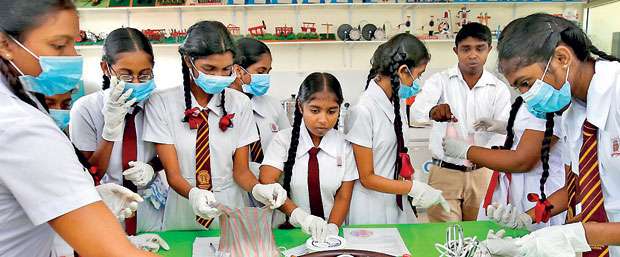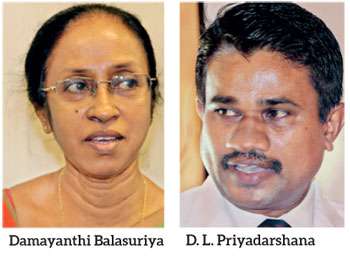16 Jan 2019 - {{hitsCtrl.values.hits}}

The Education Sector Development Programme (ESDP), envisioned by the Ministry of Education and implemented through the nine provincial education departments, Department of Education Publications and Department of Examinations, is the first Result Based Lending (RBL) programme funded by the Asian Development Bank (ADB) in Sri Lanka.
Introducing the technology stream for the GCE Advanced Level Examination was one of the key components of the of the programme costing US$ 200 million. With  the introduction of the Technology stream for GCE A/L, 250 1C schools (to include at least one school per Divisional Secretaries division) in the island were upgraded to 1AB (schools offering all streams for GCE A/L) status. As a result teacher training was developed, leadership was improved and school management was strengthened apart from the introducing of performance based financing in the provinces. It was mentioned that by October 2018 the programme had achieved 28 out of the 32 disbursement linked results and that the project would conclude in February 2019.
the introduction of the Technology stream for GCE A/L, 250 1C schools (to include at least one school per Divisional Secretaries division) in the island were upgraded to 1AB (schools offering all streams for GCE A/L) status. As a result teacher training was developed, leadership was improved and school management was strengthened apart from the introducing of performance based financing in the provinces. It was mentioned that by October 2018 the programme had achieved 28 out of the 32 disbursement linked results and that the project would conclude in February 2019.
"Of the 795 students enrolled to the GCE Advanced Level more than a third had opted to follow a course of studies in the technological stream which was introduced to the school curriculum in 2013"
Figures provided by the Ministry of Education also showed that there was an increase in the number of students who opted to follow the Technology stream for the GCE A/L exam. In 2015, when technology was introduced, only 13452 students had taken the challenge of following the new stream while 18800 students had enrolled in 2017. Students who select technology have the choice of either following Engineering Technology (ET) or Bio System Technology (BST) and offer Engineering Technology, Information & Communication Technology (ICT), Science for Technology (ST) and Bio Science Technology (BST) as subjects for the A/ L Exam. “At present 25% of the marks are for practical projects and it would be increased to 40% in the future” said Rathnayaka Karunasiri Head of the Education Sector Development Programme.
“We would have had to face many problems if the Asian Development Bank did not support the initiative to introduce technology for the GCE Advanced Level,” said Sunil Hettiarachchi Secretary to the Ministry of Education at the time. “As the loan scheme is extremely flexible and is Result Based Lending (RBL) we have the freedom to set our own targets and funds would be released only if we achieve them” he added. “As an example, if we agree to increase the number of students following the science stream to 25% we would not be eligible even if it was 24.9%. In simpler terms we are tied down by our commitment” He said that the universities had opposed the introduction of the technology stream and had established seven technological faculties and confer first degrees
in technology.
 “It is the Ministry of Education that has to present the Education Sector Development Framework Programme (ESDFP) and the ADB and the World Bank have agreed to support it. In this instance the ESDFP was US$ 4.9 billion of which the ADB has agreed to give US$ 200 million and the disbursement would be achieving the key results” said Herathbanda Jayasundera Social Development Officer of the Asian Development Bank’s Sri Lanka mission who is in charge of coordinating the programme.
“It is the Ministry of Education that has to present the Education Sector Development Framework Programme (ESDFP) and the ADB and the World Bank have agreed to support it. In this instance the ESDFP was US$ 4.9 billion of which the ADB has agreed to give US$ 200 million and the disbursement would be achieving the key results” said Herathbanda Jayasundera Social Development Officer of the Asian Development Bank’s Sri Lanka mission who is in charge of coordinating the programme.
Increasing the performance at the GCE O/L and GCE A/L was one such goal and statistics made available by the Ministry of Education showed that there has been a gradual increase in the pass rate each year. “We make an independent Evaluation to see if the facts and figures are correct and if the result has been actually achieved” Jayasundera added.
Narandeniya Central is a mixed 1AB secondary school situated in Kamburupitiya in the Matara District and has 2340 students on roll and a teaching staff of 108. Of the 795 students enrolled to the GCE Advanced Level more than a third had opted to follow a course of studies in the technological stream which was introduced to the school curriculum in 2013.
Narandeniya Central College was one of the schools that tried out the technological stream with the GCE Advanced Level batch when it was introduced. The school has been able to make remarkable progress in terms of achieving results. “Due to the high demand to enroll for the GCE A/L Technological stream of study we were compelled to take the applicants’ innovativeness into consideration as the ultimate selection criteria” said Narandeniya Central College Principal D L Priyadarshana while briefing journalists about the school’s achievements.
The demand to follow the technology field for the GCE A/L at Narandeniya Central was due to the high percentage of passes gained in Technology subjects. It was between 82% and 93% at the 2017 GCE A/L which has resulted in the increase in the number of students qualifying for admittance to Universities and other institutions of higher education. These results have also empowered students who followed the stream to be able to venture into their own enterprises.
It is revealed that a high percentage of students who had followed the technology stream at Narandeniya CC had gained admission to universities or other institutes of higher learning while others had ventured into starting their own enterprises. The pathways selected by students who sat for the GCE A/L in the technological stream in 2015, 2016 and 2017 are given below.
Future plans proposed for students following the technology field at Narandeniya Central includes plans to give them more opportunities so that they can put into practice the theoretical knowledge they gain inasmuch as to apply the knowledge to solve problems that crop up in day to day life.
The school conducts classes outdoors to motivate the younger students to follow the technology stream. The school boasts of a green house, an ecofriendly farm, a three-storeyed technology faculty with well-equipped laboratory facilities and workshops where students get an opportunity to work in groups and put theory into practice under the guidance of teachers.
While Sanduni Piyumasha Kodippilli secured the top rank in the Bio System Technology Stream at the 2018 GCE Advanced Level examination, Ishan Madhushanka and Prabodha Nishadhi were two among the many who excelled at the GCE Advanced Level in 2017. Ishan was ranked 2nd in the district while Prabodha was ranked 3rd. Prabodha Nishadhi, now 20 years old, offered Agriculture, Bio Systems Technology and Engineering Science Technology for the GCE A/ Level Examination and was rewarded with A passes in the first two subjects and a C pass for the latter. She has gained admission to study Bio Systems Technology at the University of Sri Jayawardenapura.
“I selected the technology field because I love nature and the course content contained more practical work outdoors compared to the normal science stream which is mostly theory” she said. “In addition I have gained sufficient general knowledge on ICT and Engineering Technology and am capable of meeting any challenge” she added.
"Figures provided by the Ministry of Education also showed that there was an increase in the number of students who opted to follow the Technology stream for the GCE A/L exam"
“Prabodha had her primary education at the Kirinda Junior School and obtained 130 marks at the grade five scholarship examination” said her mother, Ganesha Jayamali. Prabodha gained admission to Matara Central College where she sat her GCE O/L and secured 3 A’s, 5 B’s and a C after which she opted to seek admission to Narandeniya Central College. “She loves nature so much that she has prevented us from felling any trees on our premises. It is she who does most of the maintenance work at home” she added
Sanduni Muthumali obtained an A (Agriculture), a B (Bio Systems Technology) and a C (Science for Technology) at the GCE A/L Examination in 2016 and was ranked 5th in the district. She is following a degree course in Bio System Technology at the University of Colombo. “My parents did not influence me in any way and I took up the challenge and succeeded” she said.
During the past five decades the ADB has provided US$12.5 billion in the form of loans and grants to the education sector to assist its developing member countries achieve the goal of education for all. ADB has agreed to provide another US$ 200 million to the Ministry of Education to support ESDP 2.
30 Nov 2024 1 hours ago
30 Nov 2024 4 hours ago
30 Nov 2024 6 hours ago
30 Nov 2024 7 hours ago
29 Nov 2024 29 Nov 2024